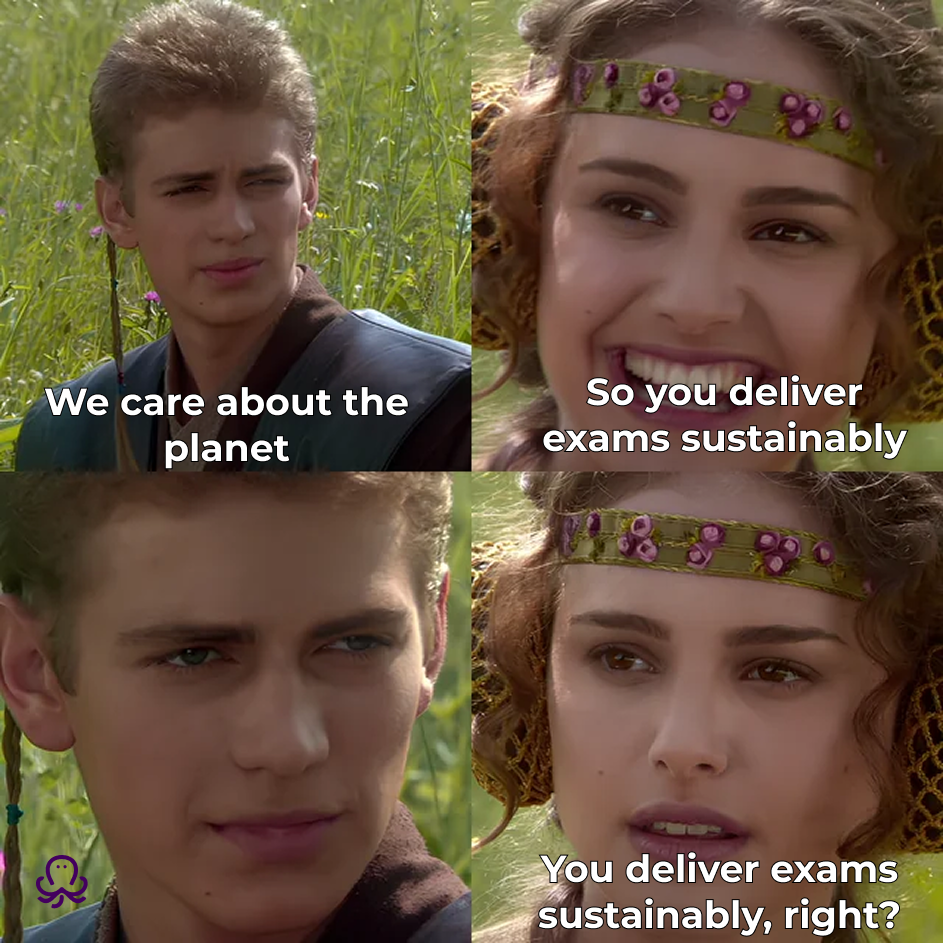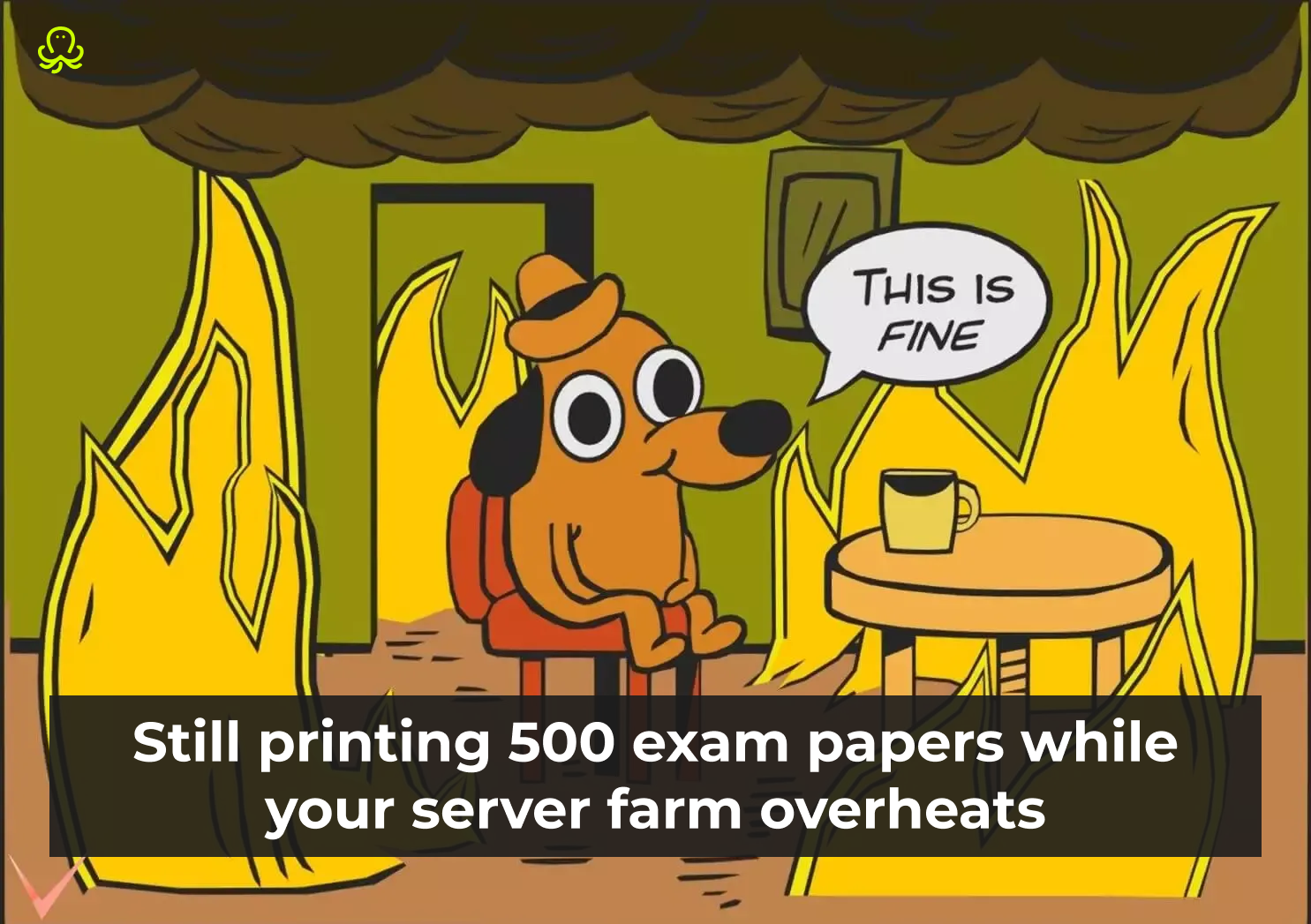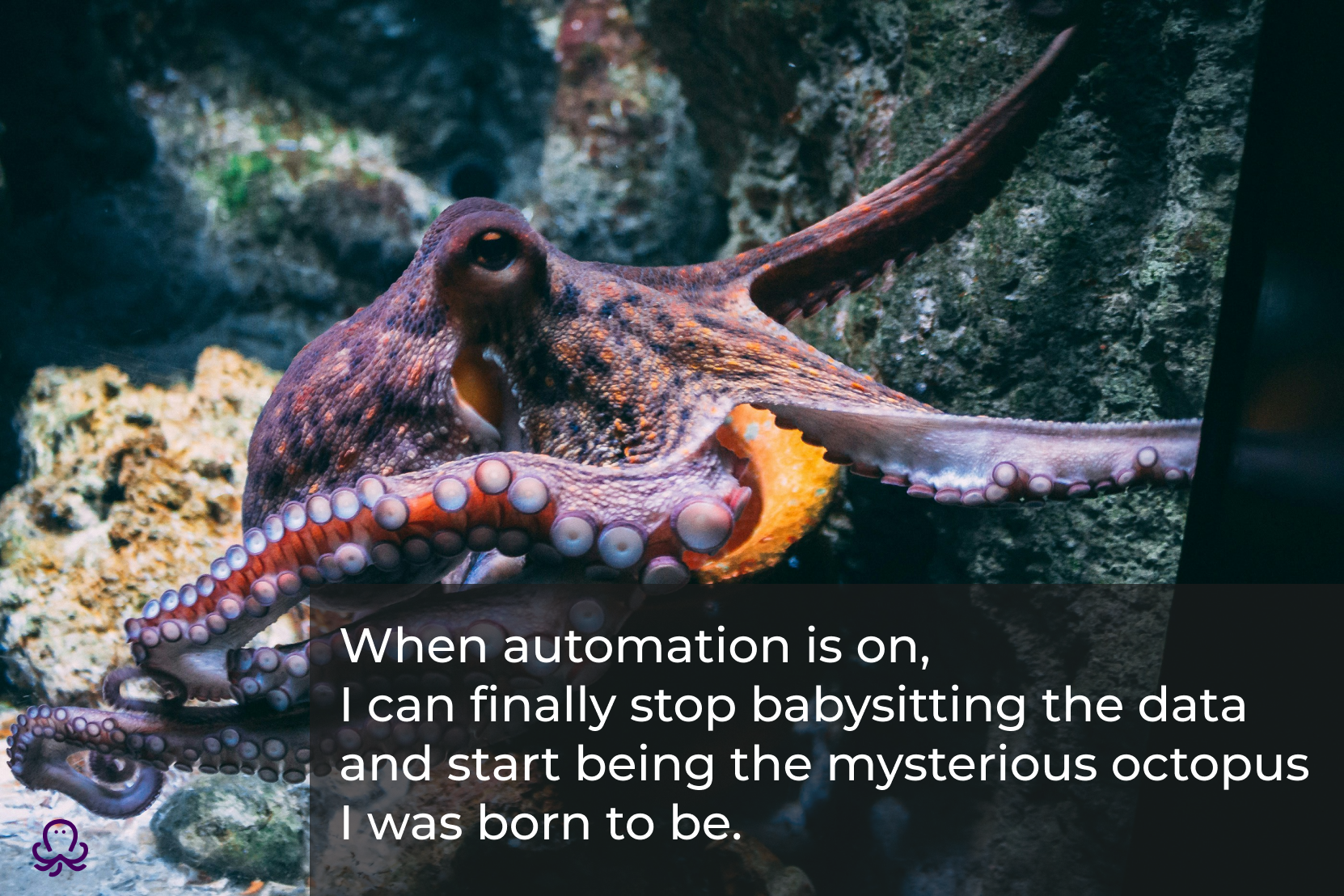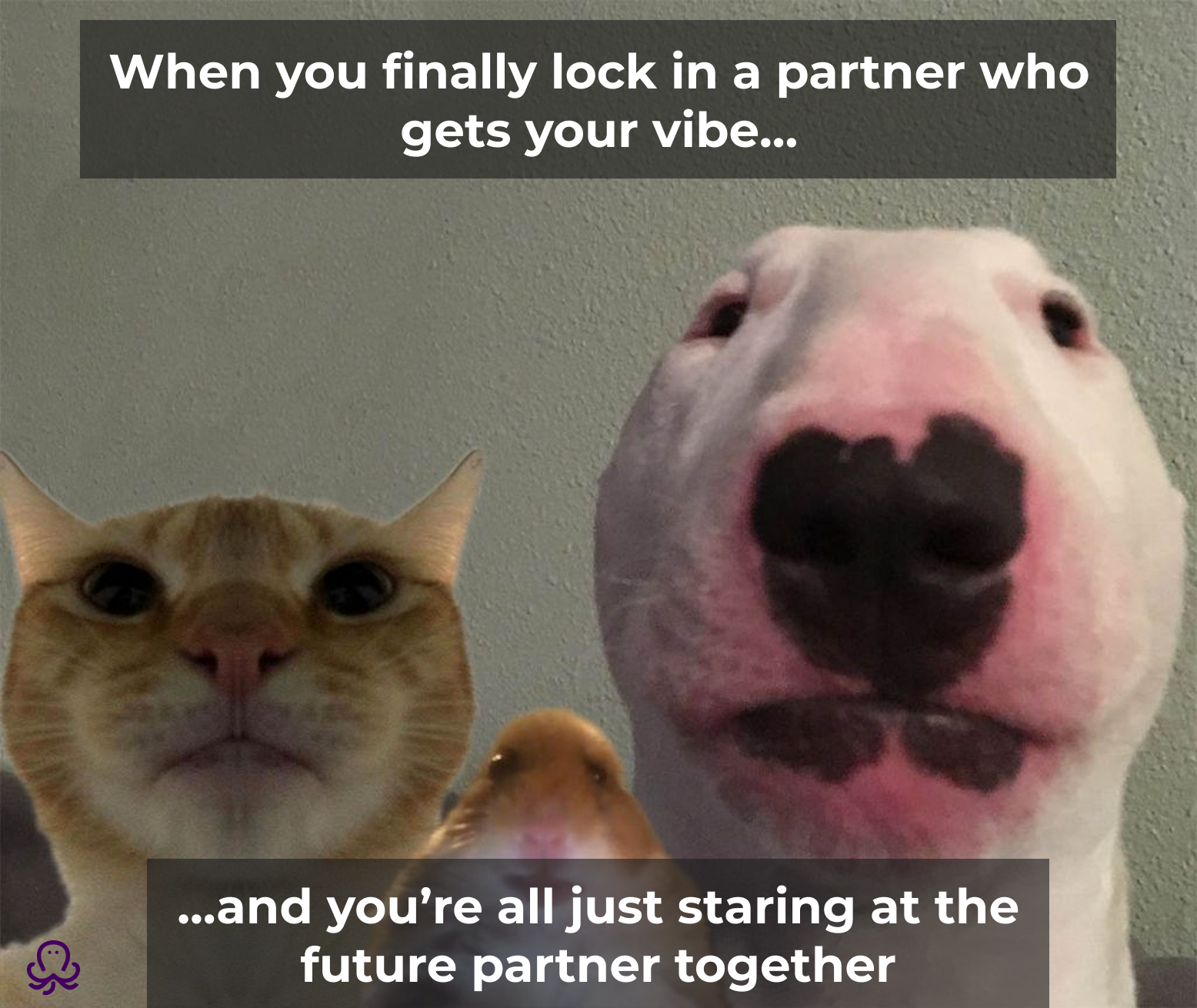Remote proctoring can help make education more sustainable. By replacing travel, paper, and physical test centers with secure digital exams, we reduce carbon emissions and promote equity. With low-bandwidth tech, efficient cloud use, and mindful data practices, OctoProctor help institutions deliver assessments that are both credible and planet-conscious.
Education is undergoing a profound digital transformation with online learning, assessments, and proctoring becoming the norm. But as digital adoption soars, so does the hidden environmental cost. The more students take exams online, the more servers spin, data moves, and energy is consumed.

The rise of digital assessments has made testing more accessible and inclusive, yet it also demands that we take a closer look at digital sustainability. Can we truly talk about fairness in education without considering fairness to the planet?
For OctoProctor, sustainable online exams are not a futuristic idea. They are a responsibility. Our mission is to enable remote proctoring with minimal environmental impact while maintaining the highest standards of academic integrity.
When exams go remote secured by online proctoring, a lot more than location changes. We move away from traditional exam halls and printed test sheets, toward sustainable, tech-powered environments. And that shift makes a real difference.
With OctoProctor, every exam happens online, with zero commuting, zero paper, zero air-conditioned buildings full of fluorescent lights. That’s a huge contrast to in-person exams, where every session means travel emissions, energy-intensive buildings, and a pile of paper that’s used once and thrown away.

That’s the promise of sustainable exam technology — not just moving things online, but doing it in a thoughtfully green way. As more institutions embrace sustainable online exams, these changes scale: 10,000 remote exams means hundreds of metric tons of carbon saved. Now imagine that across a whole certification ecosystem.
Digital exam sustainability doesn’t mean compromise. It means clarity, convenience, and a lighter impact on the planet. All at once.
The real power of sustainable proctoring shows up behind the scenes, where architecture, data practices, and smart operations meet. If you want green digital exams, you need more than just “online instead of in‑person”; you need infrastructure built for minimal waste.
That is why we opted for AWS to run OctoProctor Cloud. AWS is well-known for setting the bar: their infrastructure claims to be up to 4.1× more energy‑efficient than typical on‑premises systems and capable of reducing workload carbon footprints by up to 99 %.

When an assessment platform is built on cloud‑native, auto‑scaling infrastructure, it means you’re only using resources when you need them. No idle servers draining power.
Here’s how our take on the sustainable exam‑tech stack looks:
In an age of digital abundance, data is both a gift and a burden. Every click, frame, and log creates a footprint. Not just on storage, but on the environment. That’s why OctoProctor, as a sustainable proctoring platform, is very transparent about the way we handle data.
A key principle in sustainable exam technology is data minimization. Not every exam needs terabytes of footage or dozens of redundant logs. The goal isn’t to hoard data, it’s to collect just enough to ensure academic integrity and support investigations if needed, then responsibly delete the rest. Fewer files stored = fewer servers needed = lower energy use. It’s that simple.
One-off cleanups don’t cut it. Digital sustainability depends on automated retention policies: if data isn’t needed beyond a defined period, it’s archived or deleted automatically. Not because someone remembered, but because it’s built into our system. This reduces both human error and digital waste.

Behind every smooth dashboard is a server chugging away. Sustainable exam platforms optimize database performance, query efficiency, load balancing, and regular pruning to avoid data bloat and the associated energy drag. Think of it as digital spring cleaning that never ends.
Being an eco-responsible EdTech solution for OctoProctor also means being clear with institutions and test takers: what data is collected, how long it's stored, and what for. Transparency builds trust and prevents overengineering surveillance-heavy solutions that quietly rack up carbon costs.
One of the myths of sustainability in tech is that it’s only achievable by staying small. But in reality, scalable infrastructure and inclusive design can work hand in hand with low environmental impact if built with care.
Not every student has fiber internet, a brand-new device, or an ideal study space. That’s why sustainable remote education must account for real-world conditions. Platforms that are efficient under low bandwidth and modest equipment needs do more than reduce energy usage—they reduce inequality. Sustainable online exams aren't just about carbon. They are also about access.
It’s not just what we build, but who we build with. The vendors, infrastructure providers (we have already mentioned AWS), and third-party services we choose all have environmental footprints of their own. That’s why green digital exams depend on aligning with partners who share that commitment.

When sustainability becomes part of the product’s DNA — not a late-stage add-on — it supports eco-responsible EdTech solutions that grow responsibly. That means no bloated codebases, no server sprawl, and no scaling at the cost of the planet. True growth doesn’t just scale fast. It scales right.
The way we work affects the planet as much as the products we build. And in education technology, the shift to remote-first isn’t just a workplace perk — it’s a sustainability win.
Because our entire team works from wherever they are — be it Brazil, Portugal, Germany, or Cyprus — we eliminate the environmental impact of office commutes. No cars, no flights, no heating or cooling in test center buildings. Just smart, async-first collaboration with minimal emissions and maximum flexibility. This is what low-impact operations look like in practice.
We support our customers remotely, too. From onboarding to training and troubleshooting, everything we do happens online. Institutions don’t need to fly us in or schedule onsite visits. Our support is fully online, just like our platform. That means (of course!) less travel-related emissions, and faster, more responsive service across time zones. This remote-first customer collaboration model helps us scale sustainably, staying agile while supporting test organizers around the world.
Being remote-first is not just a workstyle; it's a green commitment. When your operations and your product both cut unnecessary travel, you’re doubling down on eco-responsible EdTech.
At OctoProctor, we believe integrity and sustainability go hand in hand. While our job is to protect the fairness of digital assessments, we also carry the responsibility to protect the planet they happen on. From supporting institutions remotely to reducing energy waste in infrastructure, we’re committed to making every exam session part of a more sustainable future.
And we know we’re not alone.
We invite our partners, clients, and fellow EdTech innovators to join us in designing a digital education landscape that’s not only fair and accessible but also environmentally responsible.
Because in every click, every camera check, and every exam delivered remotely, there is a quieter footprint and a louder message: education can be secure and sustainable.
Let’s talk about how your institution can combine academic integrity with digital sustainability. Our team will walk you through eco-friendly proctoring solutions designed to reduce your footprint without compromising security.
Let's talk